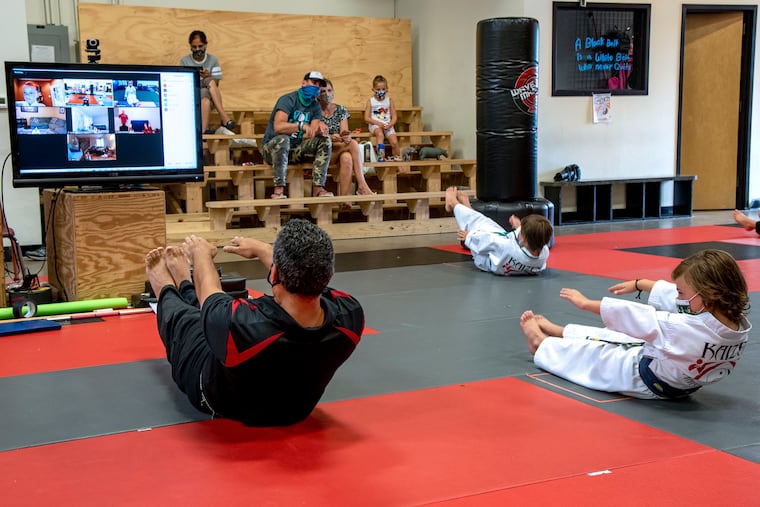Yoga studios and martial arts gyms reopen in New Jersey with mixed confidence
For bigger businesses, the mandated drop in capacity was a blow, but with the potential for a rebound — a guarantee not promised to boutique fitness studios based on their small classes with individualized attention.

Gina Ward marked the five-year anniversary of her yoga studio with a celebration class in March and hugs and high fives from her students.
Last month, she gave up her rented space in Cherry Hill to teach all her classes online.
“I knew I’d maybe be able to have five people plus one teacher in my space, and that’s expensive to open up for just a few people,” said Ward, 43, who was diagnosed with leukemia last spring and then confronted this spring with the task of managing her small business, Heart and Grit Power Yoga, as the coronavirus pandemic walloped the global economy.
She now rents a small space in a friend’s home that doubles as a business so she can teach yoga on Zoom several times a week.
“It was definitely not something that was in the books,” she said. “Online yoga had not even occurred to me as a possibility.”
A few weeks after Ward ended her studio lease for health and financial reasons, New Jersey Gov. Phil Murphy said indoor recreational activities including archery, dance, yoga, and theater programs could reopen at 25% capacity, excluding employees.
The directive, formally called Order 157 and released July 21, carried additional stipulations. Students in a martial arts class, for instance, were prohibited from sparring or practicing close-contact drills, and clients were ordered to wear masks if they were not at least six feet from others.
In Pennsylvania, gyms and fitness centers have been allowed to reopen at 50% capacity.
» READ MORE: Philly gyms are reopening, but restrictions and a worried public have them wondering if they can survive
For bigger locally owned businesses, the steep drop in capacity was a blow, but with the potential for a rebound — a guarantee not promised to boutique fitness studios based on their small classes with individualized attention.
And in the thick of summer, business owners said fewer clients have attended their classes, abandoned in favor of vacation or the couch.
Those who have continued to attend exercise classes in person now reckon with the added hurdle of wearing masks.
“How can I teach anyone to inhale through their nose and exhale through their mouth with a mask on?” said Satima Fisher, owner of Relax and Hang Aerial Yoga in Philadelphia. “That’s the primary principle of yoga.”
Others have opted to exercise from home, where they follow a livestreamed class and forgo in-person instruction to be spared from their peers’ sweat and labored breathing.
» READ MORE: Is it safe to return to the gym? How to protect yourself against the coronavirus as gyms reopen.
“I started every class with hugs and high fives, so I definitely miss that,” Ward said, “but I’ve connected with more people all over the place. It’s been really great. It’s forced this yoga community to really play a little bigger. And yoga’s not about a building, so it’s kind of, maybe, brought us back to the purpose of it all.”
Even at gyms that are now allowed to be open again, in-person attendance is often low, said Frank LoPinto, who has owned Kaizen Martial Arts of NJ with his wife, Stacie, since 2005.
“People are still apprehensive to come out, even though we are offering in-person classes,” he said. “Still, probably about 80% of people are staying home and doing it online.”
LoPinto, 54, livestreams in-person classes for his students who choose to stay home. Those who show up to the gym, a 5,000-square-foot facility in Mount Laurel, claim a square-shaped and socially distanced practice area as a video camera records the training. And as an instructor leads the in-person class, another instructor is on the Zoom call, monitoring students training at home.
“We have a very interactive way that we work with students at home,” said LoPinto, who earned a doctorate in operations research and taught at LaSalle and Rowan Universities before he became a martial arts instructor teaching a mix of karate, Krav Maga, and tae kwon do. “We have someone at the computer who is actually doing that.”
» HELP US REPORT: Are you a health care worker, medical provider, government worker, patient, frontline worker or other expert? We want to hear from you.
Though he has loyal students who regularly attend class, he said, business generally lulls in the summer. He can still pay bills, but it’s “generally not a great time to get new students.”
“Now with the uncertainty of what’s going to happen — schools starting, other sports — there are a lot of questions,” he said. “The prospect of the phone not ringing — that’s the thing that’s a little more troublesome.”